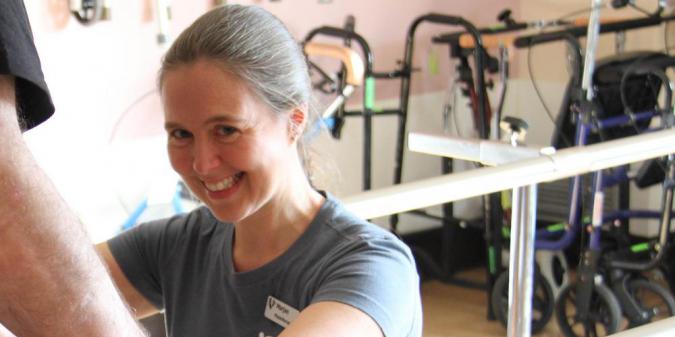Marjan Szlivka, physiotherapist helping protect all professions
HSA REPORT MAGAZINE, APRIL 2016
BY LAURA BUSHEIKIN
It's not my business.
That's what Marjan Szlivka thought when she first heard that registered psychiatric nurses within HSA were being raided by BCNU.
In her work as a physiotherapist at Eagle Ridge Hospital in Port Moody, Szlivka didn't work with RPNs, and their situation wasn't on her radar.
But once she learned more, she not only got concerned, she got active. She realized that the core issue was the integrity of HSA as a unique health care professionals' union, and she knew this was something she wanted to defend.
"From the very beginning, HSA has represented a very large number of extremely diverse professions and it does that very, very well. Also, HSA is solutions-driven, collaborative, and positive. It's not afraid to go up against the employer or the government when needed, but this is not done in an antagonistic way; rather, it's about looking for a path forward.
"Another strength of HSA is in how it represents professions in a way that highlights the value of all members of the healthcare team," says Szlivka.
Szlivka joined a campaign to phone RPNs on behalf of HSA to offer support, explain the legalities of what was happening, and find out if there were any gaps in the services HSA was offering them.
"Part of what upsets me is that HSA members' safety has been put at risk. BCNU organizers have come on to psychiatric units and interfered with RPNs providing care, and have bothered HSA RPNs outside of the workplace," says Szlivka.
"What really frustrates me too, is that the raiding actions by BCNU have the potential to sour otherwise very good working relationships between HSA and BCNU members – we are all members of multidisciplinary teams who work together collaboratively to provide excellent patient care, each respecting each other's individual skills and roles. Anything that has the potential to sour these relationships is not good."
This wasn't Szlivka's first foray into workplace advocacy. In Dublin, where she trained and spent the first seven years of her career, Szlivka was very active in her professional organization. She got involved in HSA four years ago as an occupational health and safety teward. Last year she joined the Constituency Liaison program, which trains and supports HSA members to meet regularly with their MLAs to discuss public policy issues of importance to the HSA membership. Most recently, she's become a steward.
Szlivka is full of encouragement for anyone considering getting involved with HSA. "If someone taps you on the shoulder, say yes! You will be supported. The education provided by HSA is second to none. It really sets you up for whatever role you take on. And it's ongoing. There's always someone you can phone or email with a question. You are not alone."
It's important for all HSA members to be aware of what the union does, not just at the workplace but on multiple political and social levels, she says. "Going to convention really opened my eyes to the full scope and breadth of what HSA does. For instance, I learned how HSA works with government through the Constituency Liaison program to connect members to MLAs with a focussed, wide-reaching message. This has a real impact on the decisions government makes. And there are committees addressing a whole range of social justice issues."
Union activism comes naturally to Szlivka. Her family isn't political in any organized sense, she says, but her father was an active volunteer and her mother is still very involved in her community. "You have a responsibility for making your community better. It's just one of those things that you do – you get involved."
Her career choice, on the other hand, took her a bit by surprise. "I'm a failed vet!" she explains with a laugh. "I grew up on a farm, and from the time I was 12 I just knew I wanted to be a vet."
But life sometimes has a way of taking us not where we want to go, but where we belong.
"My intention when I got into physio was to work with animals, not people. But once I started my clinical placements I realized that this was what I was meant to do. What I love about being a physio is the relationships of trust and understanding that you build with your patients. The way you help them through their journey, wherever that might be.
"It's the same reason I enjoy my work with HSA – it's about building relationships and helping people who need practical support in the workplace or working towards change on a larger scale. I just know I'm in the right place."
That's good news, not just for her patients, but for the membership of HSA, which has in Szlivka a dedicated and effective advocate.
